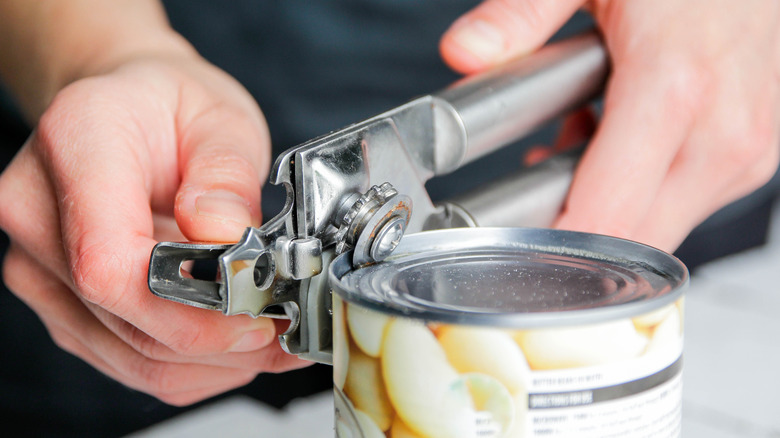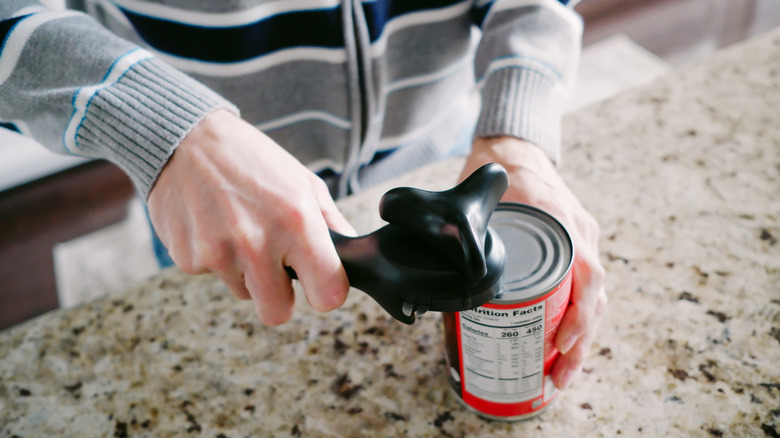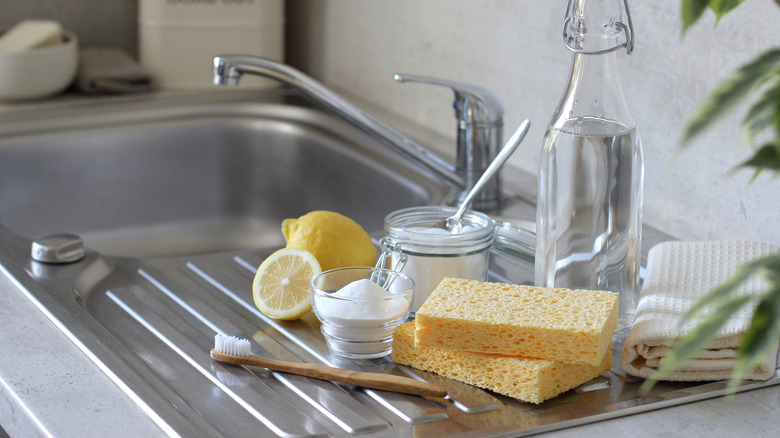Top Signs Your Can Opener Needs A Deep Clean
Can you remember the last time you cleaned your can opener? The truth is, even the tidiest among us can have blind spots when it comes to keeping an immaculate house or apartment, so it's not really surprising that there are endless lists out there of the places you are likely forgetting to clean in your home. This is especially true for the kitchen, where food spills, water buildup, and grease splatters are a regular occurrence. Not to mention the many nooks and crevices that can become breeding grounds for food scraps and harmful bacteria. Even the dirty truth behind your kitchen sponge is not much of a secret anymore. But it might surprise you that your can opener is one of those neglected items that needs a closer examination.
Most people don't think to clean their can opener regularly, if at all. They may not realize that the residue from tops of cans and juice from their internal contents build up over time and can affect the overall safety, use, and lifespan of your device. Even if you have gotten in the practice of wiping down your can opener after each use, it actually needs special attention every now and then. But when do you know it's time to devote a little extra time to deep cleaning it? If you notice that your can opener is showing signs of rust, isn't performing as well as it once did, or has visible stuck-on particles of food gunk, it's high time for a scrub.
Knowing when to deep clean your can opener
The next time you are in the mood, or there is a strong need to deep clean your kitchen, we challenge you to take a good look at your can opener. We are even willing to bet that you will find it's dirtier than you expect it to be. One of the easiest ways to identify that your device is in need of a good scrub is visible gunk around its major components — like the blade, magnet, and gears. You may also see rust, which tends to form whenever iron, oxygen, and water come in contact with each other. This caked-on residue from food particles and moisture damage is not only a potential source of bacteria, it can lead to the device's diminishing performance and possibly even needing to be replaced.
A can opener should glide smoothly and the intricate mechanisms should move easily with limited force. If your device's performance has decreased over time, that's a pretty clear sign it needs to be deep cleaned. For instance, if you're struggling to pierce the top of a can of soup, or using Hulk-like strength just to turn the dial, it's probably time for a good scrub. Simply put, you know when your device isn't working as well as it should be. The great news is that compared to all of the other hard spots to get clean in your kitchen, reviving your dull and dirty can opener is an easy task.
How to deep clean it
It's recommended that you first soak your can opener to loosen up build up around the blade, wheel and magnet. Among the most common household ingredients you should use, white vinegar is easily the most popular, and this is a good opportunity to make use of it. To start the deep cleaning process, submerge major components of your can opener in pure white vinegar. You will want to give it anywhere from a few minutes to a few hours to soak, depending on how much gunk needs removing. Once you start soaking, you'll know it's working because bubbles will start to form near the grimiest spots.
When you're ready to scrub, use a narrow brush (like an old toothbrush) to clean the blades and gears. When your brush becomes discolored, rinse it and continue scrubbing until the brush no longer picks up dirt. Once your can opener is noticeably cleaner, you can do one last scrub with dish soap to remove any remaining grease. Another popular cleaning method is to clamp your can opener blades around folded up wax paper and turn the gears. This will pull up any gunk stuck in essential parts of your device without water or scrubbing. For an electric can opener that can't be submerged in water, you can use a small cloth or toothbrush dipped in rubbing alcohol to spot clean. Whatever you do, just remember that it's essential to dry your can opener throughly after cleaning to prevent rust.


